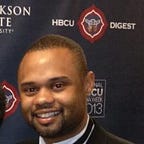Remember That Time Marilyn Mosby Saved Baltimore?
The Tuskegee alumna helped to calm a city, and gave America a glimpse of the potential of true justice for all.
Charges dropped, at least in America’s ongoing struggle with race and equity in its criminal justice system, should never outrank or outflank charges filed. Charges filed signals a clear intent to enforce accountability, to invest public interest and resource in the notion of justice overarching race, class and political interest.
Charges dropped means the burden of proving guilt beyond a reasonable doubt became too high of a standard to meet, and a poor investment of the public trust.
But it doesn’t mean that charges never should have been filed. And it doesn’t mean that Baltimore City State’s Attorney Marilyn Mosby should be the singular target for the fragility of American justice. From the Baltimore Sun:
“If this defines my term as the state’s attorney, I’m OK with that,” Mosby told The Sun. “Because for me, my mission as a prosecutor was to seek justice over convictions, to make sure that we are holding everyone accountable regardless of occupation, sex or religion.”
“At the end of the day, this was a just process. [The officers] received due process, the verdict was rendered, and, at the end of the day, I believe justice was served,” Mosby said.
We all remember the optics; the burning buildings, the looting, the children clashing with police officers armed in riot gear, citizens calling for peace, and the video of Freddie Gray being dragged after being chased and forcefully arrested by six officers, thrown into a van, driven for miles without medical attention, and ultimately dying as a result.
The coroner called it a homicide. Mosby saw a collection of cases that would bundle into a moment for justice to be used as a tool for cultural restoration, for healing — not just in Baltimore, but for Black America at large. She knew that the moment was bigger than her, bigger than Freddie Gray, bigger than Baltimore. Oscar Grant, Walter Scott, Eric Garner, Michael Brown, FAMU alum Jonathan Ferrell and hundreds of others — it was bigger than them, too.
It was a singular chance to extract some positive withdrawal from the overdrafted joint account shared by black people and the United States’ criminal justice system. It could never equal the millions of black people killed during post-abolition, Jim Crow, or during the civil rights movement. It doesn’t come close to reparations for families of black men and women unevenly incarcerated in the national prison industrial complex.
All Mosby knew in the 72 hours between the last fire being extinguished, and the fire she started at her press conference announcing the charges, is that at some point, in some fashion, all Americans needed to know that justice cannot always be willfully avoided.
It may not always work, especially with the flexible interpretations of forensics and culture afforded to police officers in dangerous urban areas, but it cannot be avoided. And Mosby deserves credit for doing what should have been done; knowing the virtual impossibility of the task against the regrettable standards of proof for officer misconduct, the vulnerability it would cause to her professional brand, and the jeopardy in which it put the safety of her family.
All for a withdrawal that in no way begins to cover the balance of what black folks are owed.
Dallas and Baton Rouge, the scenes of terrible killings of police officers this month, could have easily been copycats of Baltimore City last May. But no one will ever give credit to Mosby for the lives she saved with the simple act of charges filed; the teenagers who may have been shot by police in continued uprising, the store owners who may have been killed trying to defend their businesses, the police officers who may have been shot while sitting in cars on city blocks.
These are phantom statistics on the lives, criminal records and businesses all preserved because Marilyn Mosby was bold enough to attempt the impossible, on behalf of the Black American experience. Individually, she will suffer as most great and courageous people do.
But because of her, a small part of us can still believe that charges filed is still a real thing in our real lives, and in our tragic deaths.
